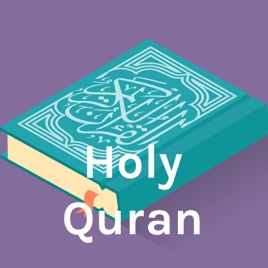
Advertise on podcast: Holy Quran
Rating
5 from
Country
This podcast has
82 episodes
Language
Publisher
Explicit
No
Date created
2020/09/11
Average duration
5 min.
Release period
9 days
Description
This is Holy Quran recite by Shaikh Mishari Rashid
Podcast episodes
Check latest episodes from Holy Quran podcast
Al-Infitar الانفطار The Cleaving in Sunder
2024/02/23
The Cleaving in Sunder [1] ( الانفطار, al-infiṭār, also known as "The Cleaving" and "Bursting Apart") is the 82nd sura of the Quran, with 19 ayat. The chapter is named 'Al-Infitar' because of the occurrence of the word 'unfatarat' in the first verse of this chapter. Infitar means 'split asunder': the word 'Unfatarat' is used in this chapter in order to describe the splitting of the sky on the day of Judgment. This chapter (Al-Infitar), along with chapters At-Takwir and Al-Inshiqaq, provides an exhaustive description about the 'Day of Judgment'.
Summary
1-5 Signs of the Judgement Day
6-9 Astonishing unbelief of man in his Creator
10-12 Guardian angels record the deeds of men
13-16 In the judgment the righteous shall be rewarded and the wicked punished
17-19 On the day of judgment there shall be no intercessor [2]
Hadith
The first and foremost exegesis/tafsir of the Qur'an is found in hadith of prophet Muhammad.[3] Although scholars including ibn Taymiyyah claim that Muhammad has commented on the whole of the Qur'an, others including Ghazali cite the limited amount of narratives, thus indicating that he has commented only on a portion of the Qur'an.[4] Ḥadīth (حديث) is literally "speech" or "report", that is a recorded saying or tradition of Muhammad validated by isnad; with Sirah Rasul Allah these comprise the sunnah and reveal shariah. According to Aishah,[5][6] the life of Prophet Muhammad was practical implementation of Qur'an.[7][8][9] Therefore, mention in hadith elevates the importance of the pertinent surah from a certain perspective.
Imam Ahmad recorded from Ibn Umar that the Messenger of Allah said: "Whoever wishes to look at the Day of Resurrection, as if he is seeing it with this eye, then let him recite: 'When the sun Kuwwirat' (At-Takwir) and 'When the heaven is cleft sunder (Al-Infitar) and 'When the heaven is split asunder (Al-Inshiqaq)'."[10][11][12]
It was narrated that Jabir said: "Muadh stood up and prayed Isha', and made it lengthy. The Prophet (ﷺ) said: 'Do you want to cause hardship to the people, O Mu'adh; do you want to cause hardship to the people O Mu'adh? Why didn't you recite 'Glorify the Name of your Lord Most High' (Al-Ala or Ad-Dhuha) or 'When the heaven is cleft asunder' (Al-Infitar)?"[13][14]
more
At-Takwir التكوير, literally "The Turning Into a Sphere"
2024/02/16
At-Takwīr (Arabic: التكوير, literally "The Turning Into a Sphere") is the eighty-first chapter (sura) of the Qur'an, with 29 verses (ayat). It tells about signs of the coming of the day of judgement. Some of these signs include the following:
(a) When the sun is covered in darkness (solar eclipse),
(b) When the stars fall,
(c) And when the mountains vanish (blown away),
(d) When the camels big with young are abandoned.
(e) And when the wild beasts are herded together
(f) And when the seas rise,
(g) And when the souls are sorted,
(h) And when the girl [who was] buried alive is asked,
(i) For what crime she was killed?
(j) And when the books [records of deeds] are open,
(k) And when the sky is torn away,
(l) And when Hell is set ablaze,
(m) And when Paradise draws near,
(n) Then every Soul shall know what it has done.
Summary
1-14 The terrible signs of the judgment-day
15-25 Oaths that the Quran is the word of Allah, and that Muhammad is neither a madman nor deluded by the devil
26-29 The Quran an admonition to all men [1]
Hadith
Whoever wants to see the Qiyamah with his/her eyes should read the verses of at-Takwir, al-Infitar and al-Inshiqaq.” [2][3]
Imam Ahmad recorded from Ibn Umar that Muhammad said: “Whoever wishes to look at the Day of Resurrection, as if he is seeing it with this eye, then let him recite: ‘When the sun Kuwwirat’(At-Takwir) and ‘When the heaven is cleft sunder (Al-Infitar) and ‘When the heaven is split asunder.(Al-Inshiqaq)’”[4][5][6]
It was narrated that Umar ibn Horayth said: "I heard the Prophet (ﷺ) reciting: 'When the sun is wound round.' in fajr. (at-Takwir (81:1)) "[7]
Sahabah reported[8] that Muhammad used to recite surahs An-Naba (78) and Al-Mursalat (77) in one rak'ah, and surahs Ad-Dukhan (44) and At-Takwir (81) in one rak'ah.[9][10]
more
Abasa عبس "He Frowned"
2024/02/09
ʻAbasa (عبس, "He Frowned") is the 80th chapter of the Qur'an, with 42 verses
It is a Meccan sura
The Surah is so designated after the word `abasa with which it opens.[1]
Summary
1-11 Muhammad rebuked for frowning on a poor blind Muslim
12-15 The Quran written in honourable, exalted, and pure volumes
16-23 Man cursed for turning aside from his Creator
24-32 It is God who provides man with food
33-37 On the judgment-day men will desert their nearest relatives and friends
38-42 The bright and sad faces of the resurrection-day [2]
more
An-Nāziʻāt النازعات "Those Who Pull Out"
2024/01/26
An-Nāziʻāt (النازعات, "Those Who Pull Out", in reference to "the angels who tear out the souls of the wicked") is the seventy-ninth sura of the Qur'an, with 46 ayat. Its name derived from the word wan-nazi‘at with which it opens. The root (n-z-‘) roughly means "to yank out with great force",[2] although it can also mean "to yearn for" or "to yearn after"
Summary
1-3 Oaths by the angels of death that there will be a resurrection and judgment-day
4 The preceding narration about the angels tasked in the following verse of 5.[4] The angels with various roles and missions perform their tasks by descending from the sky.[4] Muhammad ibn al-Uthaymeen said the tasks which angels done cannot be done by normal humans.[4]
5 The angels has roles that each of them assigned with certain tasks, such as Israfil, blowing horn of Qiyamah,[5][Notes 1] and Michael, who has been tasked to manage the dews, rains and growing plants, and Maalik, who are tasked to guard the hell while punishing the sinners.[8]
6-7 Oaths by the messengers of death that there will be a resurrection and judgment-day
8-14 Infidels shall be restored to life notwithstanding their unbelief
15-26 The story of Moses and his mission to Pharaoh
27-33 The Creator can raise the dead
34-41 The righteous and the wicked in judgment, their various condition
42-46 No one knows the time of judgment, but whenever it comes it will be soon for the infidels [9]
more
An-Naba' النبأ The News
2024/01/19
An-Naba' or The News النبأ, an-nabaʼ also known as "The Tidings", "The Announcement" is the seventy-eighth chapter of the Quran, with forty verses
Summary
The first twenty verses discuss the wonders of the worldly creation (the earth, plants, the peace of night, the mountains and rain); the final twenty verses are about the eternal wonders and horrors of the next world, with the raging sinner (the Arabic triliteral root TGY "taagheena" is used) being punished starkly opposed with the rewarding of dutiful believers in paradise.[3] The Arabic triliteral root WQY "muttaqeena" is employed as a poetic parataxis to TGY).[citation needed]
1-5 Unbelievers shall yet learn the truth of the resurrection
6-16 God the Creator and Preserver of all things
17-20 Judgment-day scenes described
21-30 The recompense of unbelievers in hell described
31-37 The joys of believers in Paradise described
37-38 No intercessor except by God’s permission
39-40 Sinners exhorted to flee from the day of wrath [4]
Hadith
Abu Ishaq narrated from Ikrima ibn Abi Jahl, from Ibn Abbas who said: "Abu Bakr [may Allah be pleased with him] said: 'O Messenger of Allah! You have become gray.' He said: 'I have gone gray from Hud (surah), Al-Waqi'a, Al-Mursalat and `Amma Yatasa'alun (An-Naba) and Idhash-Shamsu Kuwwirat (At-Takwir).'"[5][relevant? – discuss]
more
Al-Mursalāt المرسلات "The Emissaries", "Winds Sent Forth"
2024/01/11
Al-Mursalāt (المرسلات, "The Emissaries", "Winds Sent Forth") is the 77th chapter of the Quran, with 50 verses
The chapter takes its name from the word Al-Mursalāt in the first verse
Summary
1-7 Oath by the messengers of God that the judgment-day is inevitable
8-15 Woe on that day to those who accuse Muhammad of imposture
16-19 In former times infidels were destroyed for accusing their prophets of imposture
20-28 God the Creator of all things, therefore woe to those who accuse His messengers of imposture
29-40 The woe of those who have been cast into hell for calling their prophets impostors
41-44 The joy of those who did not call their prophets impostors
45-50 The infidel Quraish soon to be overtaken by the woes of the judgment-day [4]
Theme and subject matter
The sura's theme is to affirm the Resurrection and Hereafter, and to warn the people of the consequences which will ultimately follow the denial and the affirmation of these truths.
In the first seven verses, the system of winds has been presented as an evidence of the truth that the Resurrection which is being foretold by the Qur'an and Muhammad must come to pass. The reasoning is that the power of All-Mighty Allah Who established this wonderful system on the earth, cannot be helpless in bringing about the Resurrection, and the express wisdom which underlies this system bears full evidence that the Hereafter must appear, for no act of an All-Wise Creator can be vain and purposeless, and if there was no Hereafter, it would mean that the whole of one's life was useless and absurd.
The people of Makkah repeatedly asked, "Bring about the Resurrection with which you threaten us; only then shall we believe in it." In verses 8-15, their demand has been answered, saying: "Resurrection is no sport or fun so that whenever a jester should ask for it, it should be brought forth immediately. It is indeed the Day of Judgment to settle the account of all mankind and of all its individuals. For it Allah has fixed a specific time it will take place at its own time, and when it takes place with all its dreads and horrors, it will confound those who are demanding it for fun today. Then their cases will be decided only on the evidence of those Messengers whom these deniers of the truth are repudiating with impunity. Then they will themselves realize how they themselves are responsible for their dooms
Conclusion[edit]
In the end, the deniers of the Hereafter and those who turn away from God-worship, have been warned as if to say: "Enjoy your short-lived worldly pleasure as you may, but your end will ultimately be disastrous." The discourse concludes with the assertion that the one who fails to obtain guidance from a Book like the Qur'an, can have no other source in the world to afford him Guidance. [6]
Source: Sayyid Abul Ala Maududi[7][circular reference] - Tafhim al-Qur'an[8][circular reference]- The Meaning of the Qur'an[9][circular reference]
more
Al-Insan الإنسان "Human"
2024/01/05
Al-Insan ("Human") (alternative names: al-Dahr, "Endless time", Hal Ata, "Has There Not come") is the 76th chapter of the Quran, with 31 verses
Recitation by Muhammad
A hadith narrated by Abu Hurayra said that Muhammad used to recite Al-Insan together with As-Sajdah (chapter 32 of the Quran) for the early morning prayer (fajr) every Friday
This report also appears in Tafsir Ibn Kathir
The Noble Quran
1 Has there not been over man a period of time, when he was nothing to be mentioned?
2 Verily, We have created man from Nutfah drops of mixed semen (discharge of man and woman), in order to try him, so We made him hearer, seer
3 Verily, We showed him the way, whether he be grateful or ungrateful
4 Verily, We have prepared for the disbelievers iron chains, iron collars, and a blazing Fire
5 Verily, the Abrar (pious, who fear Allah and avoid evil), shall drink a cup (of wine) mixed with water from a spring in Paradise called Kafur
6 A spring wherefrom the slaves of Allah will drink, causing it to gush forth abundantly
7 They (are those who) fulfill (their) vows, and they fear a Day whose evil will be wide-spreading
8. And they give food, inspite of their love for it (or for the love of Him), to Miskin (poor), the orphan, and the captive,
9 (Saying): “We feed you seeking Allah’s Countenance only. We wish for no reward, nor thanks from you
10 “Verily, We fear from our Lord a Day, hard and distressful, that will make the faces look horrible (from extreme dislikeness to it)”
11 So Allah saved them from the evil of that Day, and gave them Nadratan (a light of beauty) and joy
12 And their recompense shall be Paradise, and silken garments, because they were patient
13 Reclining therein on raised thrones, they will see there neither the excessive heat of the sun, nor the excessive bitter cold, (as in Paradise there is no sun and no moon)
14 And the shade thereof is close upon them, and the bunches of fruit thereof will hang low within their reach
15 And amongst them will be passed round vessels of silver and cups of crystal,
16 Crystal-clear, made of silver. They will determine the measure thereof according to their wishes
17 And they will be given to drink there a cup (of wine) mixed with Zanjabil (ginger, etc),
18 A spring there, called Salsabil
19 And round about them will (serve) boys of everlasting youth. If you see them, you would think them scattered pearls
20 And when you look there (in Paradise), you will see a delight (that cannot be imagined), and a great dominion
21 Their garments will be of fine green silk, and gold embroidery. They will be adorned with bracelets of silver, and their Lord will give them a pure drink
22 (And it will be said to them): “Verily, this is a reward for you, and your endeavour has been accepted”
23 Verily! It is We Who have sent down the Qur’an to you (O Muhammad ) by stages
24 Therefore be patient (O Muhammad ) and submit to the Command of your Lord (Allah, by doing your duty to Him and by conveying His Message to mankind), and obey neither a sinner nor a disbeliever among them
25 And remember the Name of your Lord every morning and afternoon [i.e. offering of the Morning (Fajr), Zuhr, and ‘Asr prayers]
26 And during night, prostrate yourself to Him (i.e. the offering of Maghrib and ‘Isha’ prayers), and glorify Him a long night through (i.e. Tahajjud prayer)
27 Verily! These (disbelievers) love the present life of this world, and put behind them a heavy Day (that will be hard)
28 It is We Who created them, and We have made them of strong built. And when We will, We can replace them with others like them with a complete replacement
29 Verily! This (Verses of the Qur’an) is an admonition, so whosoever wills, let him take a Path to his Lord (Allah)
30 But you cannot will, unless Allah wills. Verily, Allah is Ever All-Knowing, All-Wise
31 He will admit to His Mercy whom He
more
Al-Qiyama القيامة "The Resurrection"
2023/12/29
Al-Qiyama or Al-Qiyamah القيامة meaning "The Resurrection",[1] or "The Rising of the Dead", is the seventy-fifth chapter (sūrah) of the Quran, with 40 verses (ayah).[2]
1-4 God is able to raise the dead
5-11 Unbelievers may mock, but they shall be overtaken by the resurrection-day
12-15 Man shall be his own accuser on that day
16-19 Muhammad rebuked for anticipating Gabriel in receiving the Qurán
20-21 Men choose this life, but neglect the life to come
22-25 Various thoughts of the righteous and the wicked on the resurrection-day
26-36 Man helpless in the hour of death
37-40 God, who created man, can raise him from the dead [3]
1 Nay, I swear by the Day of Resurrection;
2 Nay, I swear by the accusing soul (that this Scripture is true).
3 Thinketh man that We shall not assemble his bones ?
4 Yea, verily. We are Able to restore his very fingers!
5 But man would fain deny what is before him.
6 He asketh: When will be this Day of Resurrection ?
7 But when sight is confounded
8 And the moon is eclipsed
9 And sun and moon are united,
10 On that day man will cry: Whither to flee!
11 Alas! No refuge!
12 Unto thy Lord is the recourse that day.
13 On that day man is told the tale of that which he hath sent before and left behind.
14 Oh, but man is a telling witness against himself,
15 Although he tender his excuses.
16 Stir not thy tongue herewith to hasten it.
17 Lo! upon Us (resteth) the putting together thereof and the reading thereof.
18 And when We read it, follow thou the reading;
19 Then lo! upon Us (resteth) the explanation thereof.
20 Nay, but ye do love the fleeting Now
21 And neglect the Hereafter.
22 That day will faces be resplendent,
23 Looking toward their Lord;
24 And that day will other faces be despondent,
25 Thou wilt know that some great disaster is about to fall on them.
26 Nay, but when the life cometh up to the throat
27 And men say: Where is the wizard (who can save him now) ?
28 And he knoweth that it is the parting;
29 And agony is heaped on agony;
30 Unto thy Lord that day will be the driving.
31 For he neither trusted, nor prayed.
32 But he denied and flouted.
33 Then went he to his folk with glee.
34 Nearer unto thee and nearer,
35 Again nearer unto thee and nearer (is the doom).
36 Thinketh man that he is to be left aimless ?
37 Was he not a drop of fluid which gushed forth ?
38 Then he became a clot; then (Allah) shaped and fashioned
39 And made of him a pair, the male and female.
40 Is not He (Who doeth so) Able to bring the dead to life ?
more
Al-Muddaththir ٱلْمُدَّثِّر "The Covered" "the Cloaked One" "The One Enveloped"
2023/12/22
The Covered ٱلْمُدَّثِّر, al-muddaththir, meaning "the Cloaked One" or "the Man Wearing a Cloak") is the 74th chapter of the Qur'an, with 56 verses.
1. O you (Muhammad ) enveloped (in garments)!
2. Arise and warn!
3. And your Lord (Allah) magnify!
4. And your garments purify!
5. And keep away from Ar-Rujz (the idols)!
6. And give not a thing in order to have more (or consider not your deeds of Allah's obedience as a favour to Allah).
7. And be patient for the sake of your Lord (i.e. perform your duty to Allah)!
8. Then, when the Trumpet is sounded (i.e. its second blowing);
9. Truly, that Day will be a Hard Day.
10. Far from easy for the disbelievers.
11. Leave Me Alone (to deal) with whom I created Alone (without any means, i.e. Al-Walid bin Al-Mughirah Al-Makhzumi)!
12. And then granted him resources in abundance.
13. And children to be by his side!
14. And made life smooth and comfortable for him!
15. After all that he desires that I should give more;
16. Nay! Verily, he has been stubborn and opposing Our Ayat (proofs, evidences, verses, lessons, signs, revelations, etc.).
17. I shall oblige him to (climb a slippery mountain in the Hell-fire called As-Sa'ud, or to) face a severe torment!
18. Verily, he thought and plotted;
19. So let him be cursed! How he plotted!
20. And once more let him be cursed, how he plotted!
21. Then he thought;
22. Then he frowned and he looked in a bad tempered way;
23. Then he turned back and was proud;
24. Then he said: "This is nothing but magic from that of old;
25. "This is nothing but the word of a human being!"
26. I will cast him into Hell-fire
27. And what will make you know exactly what Hell-fire is?
28. It spares not (any sinner), nor does it leave (anything unburnt)!
29. Burning the skins!
30. Over it are nineteen (angels as guardians and keepers of Hell).
31. And We have set none but angels as guardians of the Fire, and We have fixed their number (19) only as a trial for the disbelievers, in order that the people of the Scripture (Jews and Christians) may arrive at a certainty [that this Qur'an is the truth as it agrees with their Books i.e. their number (19) is written in the Taurat (Torah) and the Injeel (Gospel)] and the believers may increase in Faith (as this Qur'an is the truth) and that no doubts may be left for the people of the Scripture and the believers, and that those in whose hearts is a disease (of hypocrisy) and the disbelievers may say: "What Allah intends by this (curious) example ?" Thus Allah leads astray whom He wills and guides whom He wills. And none can know the hosts of your Lord but He. And this (Hell) is nothing else than a (warning) reminder to mankind.
32. Nay, and by the moon,
33. And by the night when it withdraws,
34. And by the dawn when it brightens,
35. Verily, it (Hell, or their denial of the Prophet Muhammad , or the Day of Resurrection) is but one of the greatest calamities.
36. A warning to mankind,
37. To any of you that chooses to go forward (by working righteous deeds), or to remain behind (by commiting sins),
38. Every person is a pledge for what he has earned,
39. Except those on the Right, (i.e. the pious true believers of Islamic Monotheism);
40. In Gardens (Paradise) they will ask one another,
41. About Al-Mujrimun (polytheists, criminals, disbelievers, etc.), (And they will say to them):
42. "What has caused you to enter Hell?"
43. They will say: "We were not of those who used to offer their Salat (prayers)
44. "Nor we used to feed Al-Miskin (the poor);
45. "And we used to talk falsehood (all that which Allah hated) with vain talkers .
46. "And we used to belie the Day of Recompense
47. "Until there came to us (the death) that is certain"
48. So no intercession of intercessors will be of any use to them.
49. Then what is wrong with them (i.e. the disbelievers) that they turn away from (receiving) admonition
more
Al-Muzzammil المزمل, “The Enshrouded One”, “Bundled Up”, “Enfolded”
2023/12/15
Al-Muzzammil (المزمل, “The Enshrouded One”, “Bundled Up”, “Enfolded”) is the seventy-third chapter of the Qur'an, containing 20 verses, which are recognized by Muslims as the word of God (Allah). The last Ruku of this surah contains only one ayāt making it possibly the smallest Ruku according to the number of verses or ayāt
Al-Muzzammil takes its name from the reference to prophet Muhammad, in his cloak praying at night, in the opening verses of the chapter. Many commentators claim that “The Enfolded One” is a name for Muhammad, used throughout the Qur'an.[1]
Summary
1-4 Muhammad and the Muslims bidden to pray during the night
5-9 The Quran to be pronounced with a distinct sonorous tone
10-11 Muhammad exhorted to bear patiently the contumelies of the infidels
11-14 God will visit the infidels with dire calamities
15-19 The punishment of Pharaoh a warning to the people of Makkah
20 Modification of the law given in verses 1-4 [2]
Content
In the beginning of Al-Muzzammil (Quran 73), God expounds upon the merits of night prayer in the First Meccan Period. Muhammad, and subsequently the Muslim community, is commanded to “stay up throughout the night, all but a small part of it, half, or a little less, or a little more; recite the Qur’an slowly and distinctly.”[3] During the First Meccan Period, the total Qur'anic revelation was brief enough to recite during the night. As such, it was expected of Muslims to recite the Qur'an in full during the night. The night prayer was of such importance, because the believer's focus on prayer and separation from any distraction was believed to “make a deeper impression”[4] on the believer.[5]
However, as time passed, the Qur'an continued to grow, and by the time ayat 20 was revealed, the Qur'an was too long to fully recite during the night. Consequently, God relaxes his prior command to recite the Qur'an at night. Muhammad is told to pray what is easy for him during the night (“recite as much of the Qur’an is easy for you”[6]), but to continue to pray throughout the day (“keep up the prayer [during the day], pay the prescribed alms, and lend God a good loan[6])
more
Al-Jinn الجن, “The Jinn”
2023/11/30
Al-Jinn[1] (Arabic: الجن, “The Jinn”) is the 72nd chapter (sūrah) of the Quran with 28 verses (āyāt). The name as well as the topic of this chapter is jinn. Similar to angels, the jinn are beings invisible to the naked human eye. In the Quran, it is stated in that humans are created from the earth and jinn from smokeless fire.
Summary
1-2 Certain of the genii converted to Islam by hearing the Quran [4][5]3-7 The folly of men and genii in ascribing offspring to God8-9 Genii prying into heavenly secrets are driven away with fiery darts10-14 Different classes of genii, some Muslims and others infidels15-18 Believing genii rewarded in Paradise, the unbelievers punished in hell19 The genii pressed upon Muhammad to hear the Quran20-24 Muhammad can only publish what hath been revealed to him25-26 The judgments of God shall overtake the unbelievers27-28 God revealeth his secrets to his apostles only
Exegesis
2 Jinn recant their belief in false gods[edit]
In the second verse the jinn recant their belief in false gods and venerate Muhammad for his monotheism. The jinn apologize for their past blasphemy and criticize mankind for either neglecting them or encouraging their disbelief.
7 Islamic Judgement Day, Qiyamah
The Judgement in verse 7, and the punishment in verse 25, are both references to the Islamic Judgement Day, Qiyamah.
20-22 Monotheism among the Jinn is reaffirmed
Verses 20-22 are especially important as Monotheism (tawhid) among the Jinn is reaffirmed and the inescapable wrath of God is emphasized.
25-28 Qiyamah is known only to God
Verses 25-28 establish that Qiyamah is known only to God, and that God takes into account all the deeds of a man when judging him.
more
Nuh نوح “Noah”
2023/11/17
Nūḥ[1] ( نوح, “Noah”) is the seventy-first chapter (surah) of the Quran with 28 verses (ayat). It is about the Islamic prophet Nūḥ and his complaint about his people rejecting all warnings Allah gave them through Nuh. Nūḥ's themes include belief in Allah, signs of Allah (the Earth, Sun, Moon), and punishment for denying Allah's message
Summary
In Nuh, the seventy-first surah, the Quran refers to Nuh’s prophethood in snippets. Nuh is a messenger of God. When Nuh realizes the messages are not accepted by the community, he supplicated to God, who planned to flood the community of Nuh at a specified time. God commanded Nuh to warn the people
Exegesis
1-4 Noah receives message from God
Verses 1–4 discuss the message Nuh received from God (Allah) to share with his community, to serve God.
5-20 the Earth, the sun, the moon are signs of God's existence
In Verses 5–20, Nuh informs Allah that his people are not accepting his message. Nuh tries to make clear to the people that all of the Earth, the Sun, the Moon are signs of God's existence.
21-25 rid the world of the evildoers
In Verses 21–24, Nuh asks Allah to rid the world of the evildoers because they refused to abandon their idols and encourage others to do the same
26-28 disbelievers all drowned
In Verses 26–28, the disbelievers were all drowned and sent to hell (as a result of the flood). Nuh asks Allah to forgive the believers and to destroy the disbelievers because their faith will lead many astray.[3]
While studying this Surah one should keep in view the details of the Prophet Noah's story which have been given in the Qur'an above. For this see Al-Araf: 59-64, Yunus: 71-73, Hud: 25-49, Al-Mu'minun: 23-31, Ash- Shua'ra: 105-122, Al-Ankabut: 14-15, As-Saaffat: 75-82, Al-Qamar: 9-16.
more
Podcast sponsorship advertising
Start advertising on Holy Quran & sponsor relevant audience podcasts
You may also like these islam Podcasts

4.7
15
6
Muslim Girl In America
Ghaida Edreis
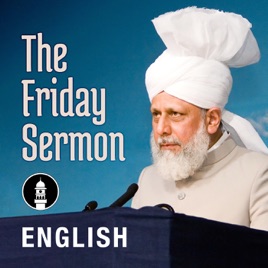
4.9
34
100
English Friday Sermon by Head of Ahmadiyya Muslim Community
Alislam.org
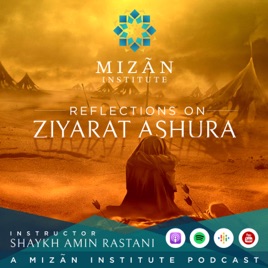
5
8
30
Reflections on Ziyarat Ashura - Mizan Institute
Shaykh Amin Rastani

5
26
141
Kardelen
Kardelen

4.9
66
54
DoubleTake, a Yaqeen podcast
Yaqeen Institute
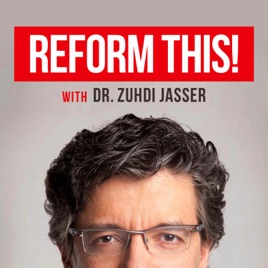
4.6
104
372
Reform This!
Blaze Podcast Network
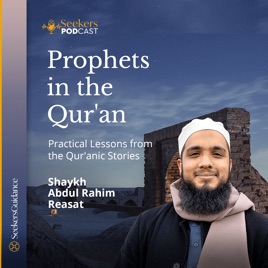
4.7
3
30
Prophets in the Qur'an: Practical Lessons from the Qur'anic Stories
SeekersGuidance.org

4.7
15
184
Shady Alsuleiman
Muslim Central
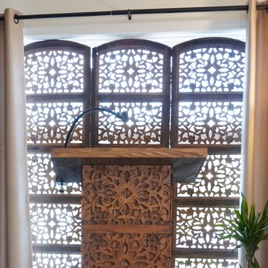
0
0
72
Al-Maqasid Khutbas
Al-Maqasid
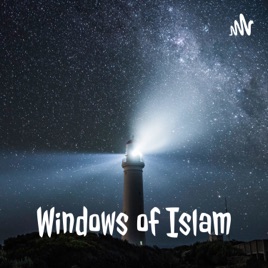
0
0
25
Windows of Islam
Lighthouse FM



